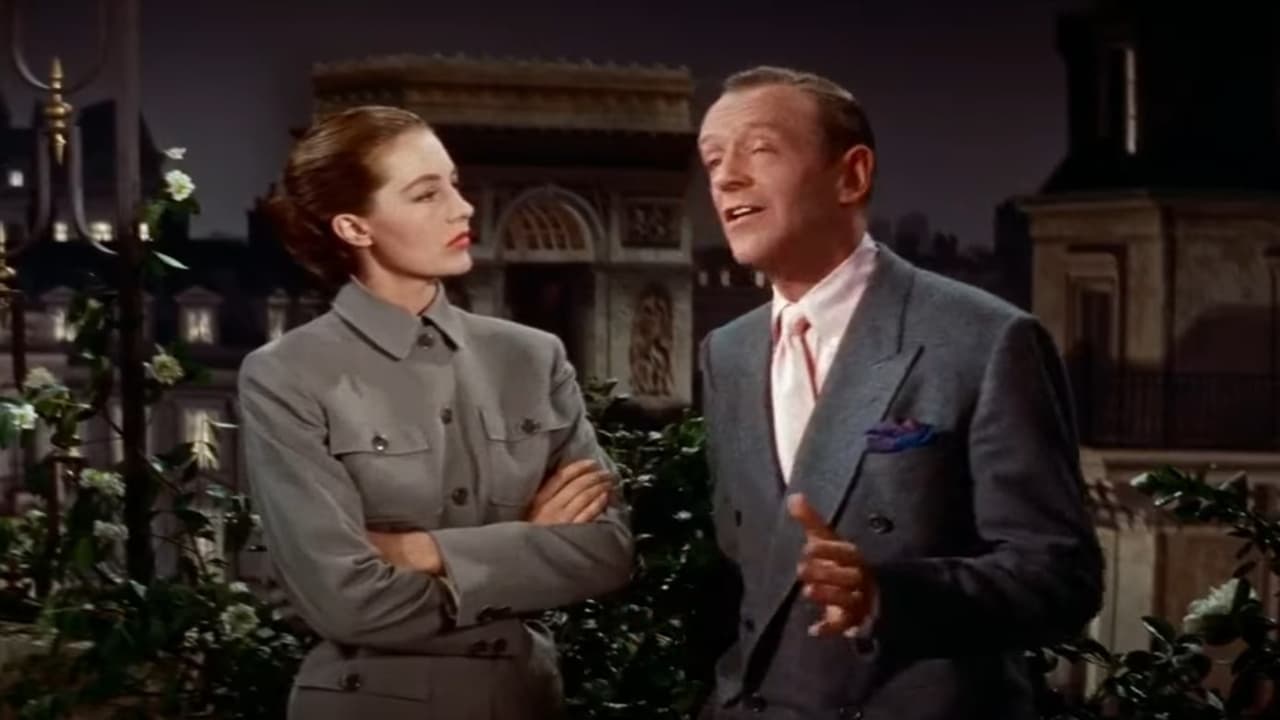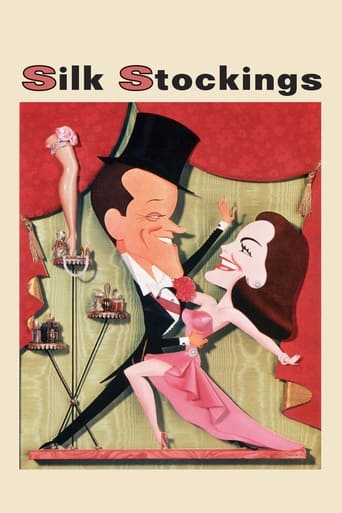

Pretty much a waste f time - Cole Porter at his weakest, routine dance numbers and overall weak acting. Comedic timing is off by a mile. If you have to do a copy of Ninotchka, at least make it your own and don't try to mimic Greta Garbo, please. Fred Astaire is wooden - why would a woman like Cyd here fall for him? Not for a minute. Obviously lots of money was spent - the result though unfortunately is forgettable. Let's forget this movie and rather enjoy Wilder's and Lubitsch' masterpiece one more time.
... View More"Silk Stockings" is based on a Broadway musical and the 1939 film, "Ninotchka." Both of those are based on a story by Melchior Lengyel, and this film further includes a book written on the original story. The 1939 MGM film was a huge success when it hit theaters just a month after the start of World War II in Europe. Efforts to revive it during the war were stopped because the Soviet Union was then an Ally. The film was banned in the Soviet Union.Cole Porter wrote the music and lyrics for the 1955 Broadway play by the same title (his last work for the stage). It starred Hildegard Neff and Don Ameche. Porter had a popular hit from the show, "All of You." He wrote one more number for this film, at the behest of Fred Astaire, "The Ritz Roll and Rock." It was Astaire's nod to the emerging music culture of rock and roll. While the stage musical was a success with 478 performances, the movie fizzled and lost MGM $1.4 in 1957. The story keeps some of the dialog of the original "Ninotchka," especially between the leads. Fred Astaire plays Steve Canfield and Cyd Charisse is Ninotchka Yoschenko. Charisse is quite good at imitating the Ninotchka of Greta Garbo, but the change in the story with the male lead casts Astaire in his all- too-familiar role as a stage or film producer or director. And, that role and his part here seem out of place and don't work well. Some of the rest of the casting wasn't that good. Janis Paige as Peggy Dayton was way overboard in a bombastic role. And, the three derelict Russian commissars here couldn't' match the three great supporting character actors of the original film. However, the inclusion of Peter Lorre as one of the commissars, with some particularly funny lines and actions, gave the film a badly needed shot in the arm. Other than the hit song, "All of Me," and the very funny and clever "Siberia," most of the musical numbers were just so-so. Even Astaire's special "roll and rock" number wasn't very special. Except for a 1968 single film return with some light footwork ("Finian's Rainbow"), this was Fred Astaire's last dancing movie. To his credit, the great master of dance quit while he was near top form. Yet, even here, Astaire's dance numbers are tame and without pizazz or creativity. Astaire continued to act and appear in films and on TV for more than two decades. But his career as a leading star in music and dance films was closed. It was an amazing career for a 58-year-old song and dance man – perhaps the greatest of all time.Seven stars may be generous for this film, but I give them for the good comedy and performances of some stars – notably Charisse and Lorre. And, because it's Astaire's swan song for his dancing career. This doesn't come close to the great dance films of the past, but it's okay for whiling away a rainy afternoon. Check the Quotes section on this IMDb Web page of the film for funny lines. Here are a few. Bibinski, "Come. We talk to him now." Brankov, "Very casual. Don't frighten him. Smile." Bibinski, "I haven't smiled in 30 years."Markovitch, on the desk intercom, "I want to look somebody up. Does this office have a copy of 'Who's Still Who?'"Steve Canfield, "Ninotchka, don't you like me at all?" Ninotchka, "The arrangement of your features is not entirely repulsive to me."Ninotchka, "In Russia, when someone wants someone, he says, 'You, come here!'" Steve Canfield, "Oh, you mad, romantic Russians."
... View MoreAfter seeing a lot of Fred Astaire films in grainy black & white RKO productions here is Fred in MGM spruced up colour. Silk Stockings is a 1956 musical remake of Ninotchka the 1939 comedy starring Greta Garbo which was billed as 'Garbo laughs.'The remake is a clash of culture musical-comedy and was made during the cold war period when the USA was looking for reds under the beds at home. Therefore there is some bite to the satire.Cyd Charisse plays the pretty but stern Russian envoy sent to Paris to bring back a musical composer unwilling to return to Russia and who has been contracted to write low brow music for a film by the producer Fred Astaire. She also has to retrieve the three bumbling idiots who were originally sent to get him back but were diverted by the glitz of Paris courtesy of Astaire. Fred distracts Cyd by taking her to nightclubs, getting her stunning outfits, showing her the landmarks as well song and dance where she begins to thaw and starts to enjoy the bourgeois and decadent lifestyle of the west. Its not long before Cyd is kicking those famous legs high.The film is a little variable in quality and also rather overlong. The studio bound Paris setting does not help matters but some of the musical numbers gets in the way of the story and pads out the running time.There is a nice supporting cast with Peter Lorre scene stealing with his between the chair and table Cossack dancing and Janis Paige stunning as the Esther William's type film star.The film is a sad farewell note to the musicals of yesteryear, there is a song and dance number called 'Stereophonic Sound.' At the climax we see Fred singing and dancing to a rock n roll number which is a take on the famous Bill Haley song which kind of has its own surreal charm.
... View MoreI'd like to start off saying something unexpected. I was struck how much the basic plot resembles that of the previous musical "Belle of New York", also starring Fred, with another famous dancer: Vera Ellen, in Cyd's role. They both involve Fred taking on the challenge(why?) of trying to break through the thick ice of a beautiful, but emotionally repressed, young woman, who is always seen wearing a drab uniform. True , Cyd's character (Ninotchka) was a much harder case to crack, but eventually, Fred succeeded in both cases. In consequence, the singing(dubbed) and dancing of Vera-Ellen and Cyd is delayed compared to Fred's, and it takes time for their characters to fully warm up to Fred's lifestyle, including exuberant dancing. They both get a dance without Fred, in their bedrooms, when they first change from their drab uniforms into some sexy female clothing(including silk stockings). In both films, it looks like they will soon marry Fred at one point. But the woman then becomes disenchanted by something, and partially reverts to her old self until the finale, when their imminent marriage is again hinted. While the earlier film was set in turn of the century NYC, this film is set in contemporary Paris and sometimes Moscow. However, the combination of Fred and Janet Blair impart a significant American flavor to the film. Thus, two musical numbers lampoon the recent pop phenomenon of rock and roll, or several film enhancement technologies commonly adopted in recent times to try to lure potential customers away from their small- screen B&W monaural TVs, back into movie theaters. The present film is much longer than the earlier film, with a more interesting and complicated plot and more significant characters. However, we are stuck through most of it, even to the end, with Cyd's unpleasant arrogant robotic monotone Soviet persona, occasionally replaced by Janet Blair's blasé personality or snippets of Cyd's westernized personality. I would rate the songs in the earlier film as being, on the whole, better, while the dancing is more stimulating in this film. Cyd's solo dancing, in the several opportunities she is given, is especially interesting. There are an endless number of jabs at the stereotypical repressed lives of Soviets, half-truth Soviet propaganda about capitalism, and paranoia, to counter Ninotchka's constant criticisms of 'decadent' capitalism, as she saw it or had been indoctrinated to expect. At one point, Ninotchka, composer Boroff, and the 3 stooge-like commisars sent to bring him back from Paris, have returned to Moscow, reminisce about how they miss their brief stay in Paris, then stage an exuberant dance to music recently composed by Boroff, while singing that they have the "Red Blues": a nifty title. Comically, during this dance, a Soviet bureaucrat walks through the room twice, inducing all to revert to pretending they are discussing the virtues of communism over capitalism. Since Fred can't get a visa to visit Russia, he thinks up a trick to induce the turn of all to Paris...The overall theme of the film clearly is that the Soviet attempt to remake human nature to be interested only in basic survival mode and to only serve the interests of the state is flawed and will ultimately be rejected by real people.In the later part of the film, Ninotchka seemingly develops a split personality, occasionally succumbing to Fred's attempt to westernize her thinking and behavior and seduce her, but then reverting to her monotone Soviet personality. Seems like she mostly lets down her guard after she's had some Champagne. In the finale, she tears up her second plane ticket back to Moscow, after learning that Fred still wants to marry her, thereby presumably proving that even the seemingly most loyal adherents to the Soviet state, given the chance, will choose to live in a western country.The 3 clownish commisars sent to bring back the reluctant -to-leave-Paris composer Boroff rather remind me of the 3 sailors on leave in "On the Town". Jules Munshin served as one of the 3 in both groups, being much taller than any of the others. The choice of Peter Lorre and Joseph Buloff as the other two seems odd, as neither was musical and the singing of both was dubbed. Would have been interesting to have the Marx Brothers or 3 Stooges at their height in their places. But would have been considered overkill, I'm sure.I wonder why the screenwriters decided to subtly deride Esther William's acting ability in clearly casting Janis Paige in her likeness, with the implication that it was doubtful if she could carry a film that lacked her swimming ballets. Interestingly, Esther's long contract with MGM had rather recently been terminated. Seldom used Rouben Mamoulian, as director, was a controversial choice. His last film musical('48) was an expensive box office flop for MGM. However, he had directed some prior successful films , as well as the stage versions of "Oklahoma" and "Carousel". More significantly, he spent his youth in Georgia, where Stalin had also spent his youth. Thus, it was felt he could help provide a more authentic presentation of the Soviets.The non-musical "The Iron Petticoat" and "Jet Pilot", with similar themes of defecting Soviet women, were released about the same time, but were box-office flops, compared to the moderate success of this film.
... View More